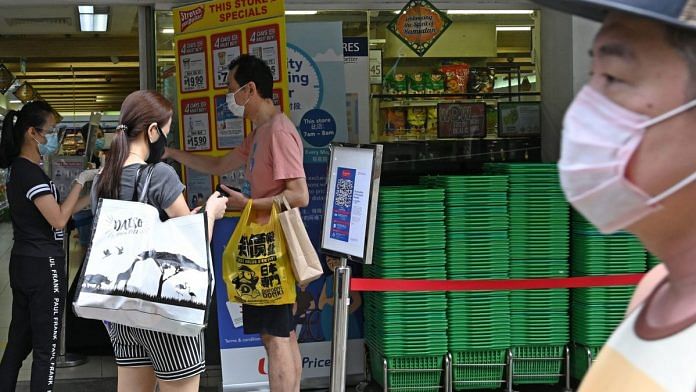One of Singapore’s top coronavirus cops, Lawrence Wong, gazed into the carefully separated audience at a premier convention center Monday and quipped that it was almost like old times. On the face of it, hardly anything is the same. Getting in the door required an onsite Covid-19 test and strict curbs prevented any mingling. Delegates masked up, even when asking questions. The coffee bar was off limits; gloved stewards brought drinks to you.
The restrictions, while cumbersome, are essential. Without them, there would be no conferences, which restarted in a limited capacity in October. Absent that staple of the lodging and hospitality industry, it’s hard to see Singapore making good on forecasts for a muscular economic recovery. The government expects gross domestic product to rise as much as 6% this year after falling 5.8% in 2020, the worst performance in history.
If and when Singapore feels confident enough to loosen border restrictions and make networking easier, Wong will have a lot to do with it. As the co-chair of a ministerial task force coordinating the pandemic response, he is among the most public faces of the city-state’s battle to contain the virus and gradually open up the economy. While other nations are locking down for the second or third time, schools and malls here are open and restaurants downtown find themselves busy at lunchtime once again.
By the diminished standards of the pandemic era, this is a big win. It’s also one achieved through strong deployment of government clout. Many outside observers, some of which tout Singapore’s Covid-19 response as a model, might then puzzle at the theme of the Institute of Policy Studies’ annual Singapore Perspectives conference: Reset.
Much of the discussion at the event centered around whether Singapore was innovative enough, and whether businesses and executives can be more creative. The world of 2030, which attendees were asked to envisage, would require more soft skills. The question hovering over the event seemed to be how the government, which has guided social, political and commercial life for six decades, should figure in this new era.
Officialdom provided the model that has attracted multinational corporations, which have helped build the world-class infrastructure and develop the regulations that make Singapore a conduit for capital, transport and labor. Yet the hub model had its skeptics at the conference. Why should Singapore settle for connecting other people’s businesses? There’s too much following when there ought to be leadership. The nation needs to be known for more than just technocratic execution.
Some of these existential questions have to take a backseat for now: Wong was careful to remind the audience the pandemic isn’t licked. Singapore’s success doesn’t prevent Covid-19 from raging outside its borders. Malaysia, about a 30-minute drive from where Wong stood, is laboring under a state of emergency. In Indonesia, a short ferry ride away, cases topped one million this week.
Without a strong state, there would be no Singapore as we have come to know it. Taxes may be fairly low and public borrowing relatively light, but the state is ubiquitous, from government-linked companies to supermarkets run by a labor organization aligned to the ruling People’s Action Party. Along the Coast-to-Coast Trail — a 36 kilometer (22 mile) immaculately groomed route across the island, which I hiked in December — you can catch glimpses of public housing, where most Singaporeans live, automated police boxes and security cameras. Signs instruct amblers how to react in the event they encounter an otter, a stray dog, monkeys or a boar. You can check your progress — or have your progress checked — by a parks service app.
Almost a year ago, the first Covid-19 cases were identified in Singapore. A few of those infected had frequented popular tourist spots around Marina Bay Sands, where the conference’s final day was held. Outside the convention center’s doors, the shopping arcades get a bit busier each week. But MBS remains a shadow of its former bustling self, dependent as it is on foreign visitors.
Every conference that offers in-person attendance is a step in the right direction. Organizers deserve a medal for jumping through all the hoops. I am also grateful for the Covid test, the first I’ve had. The text message with my results and a smiley face giving the good news came not from the hotel or the organizers. It was the Ministry of Health, which thanked me for keeping Singapore safe. If I wanted to attend, I had no other choice.
Even once the pandemic subsides, the coming years will continue to bear the imprint of the state. It may not be small but it will be effective.-Bloomberg
Also read: Singapore could live with Covid restrictions for more than a year




Majulah Singapura …